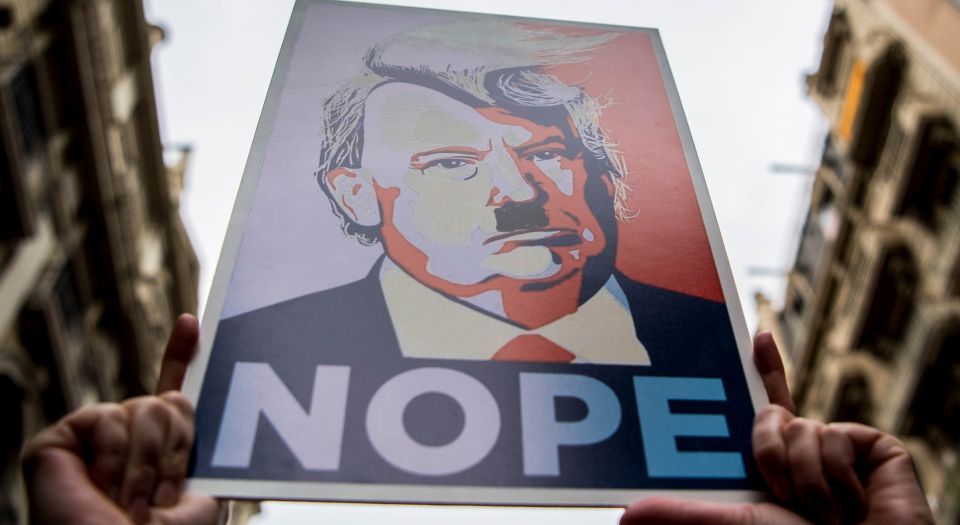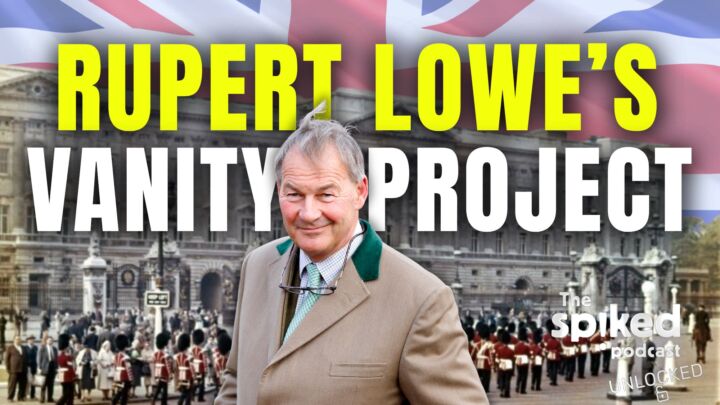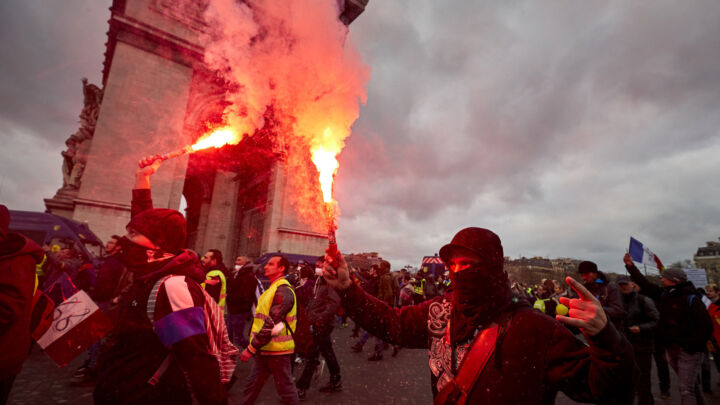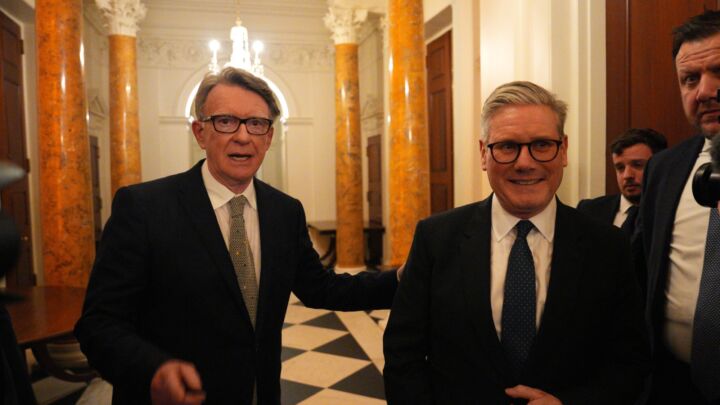
Long-read
The myth of a New Nazism
Udi Greenberg on why today’s populism isn’t a replay of the Thirties.
Want unlimited, ad-free access? Become a spiked supporter.
In June, former UK prime minister and Labour leader Tony Blair warned that today’s rising tide of populism risked ‘a return to the 1930s’. He is far from alone in drawing such an analogy. Over the past two years, since the election of Donald Trump in the US, and the Brexit vote in the UK, a flurry of op-eds, endless political speeches and countless books have all made a similar claim: that just as the institutions of liberal democracy nurtured, and then fell to, Hitler’s National Socialist German Workers’ Party, so too might our institutions nurture and fall to contemporary fascists in populist clothing.
Yet just how accurate is this analogy? It certainly does a service for those seeking to delegitimise the Trump or Brexit votes, but does it do a disservice to history? To answer these questions, we decided to speak to associate professor of history Udi Greenberg, author of the superb The Weimar Century: German Émigrés and the Ideological Foundations of the Cold War, and, with Daniel Bessner, co-author of the essay ‘The Weimar Analogy’.
spiked review: Do you think the Weimar analogy – that, effectively, today’s populists are yesterday’s fascists – obscures the historical specificity of the rise of Nazis?
Udi Greenberg: Every analogy has its limits, but that doesn’t mean analogies can’t be useful. The question is how we use it and to what purpose, and I think the usage of the Weimar analogy for our specific moment is more distracting than helpful. That is in part because the differences between the fall of the Weimar Republic and the populist surge today far outweigh the similarities.
For a start, the collapse of the Weimar Republic happened in the midst of the worst economic crisis of the 20th century, when a third of the potential workforce was unemployed. Nothing on the scale of that economic calamity is happening today. Yes, the rise of populism is still tied to important economic transformations that have happened in the past two decades, but these do not amount to anything of the order of the Great Depression.
The Weimar Republic also fell because the fascist movement used mass violence on the streets and decimated democratic and socialist, left-wing political forces. We have not seen anything similar to that today. Even the despicable violent march of white supremacists in Charlottesville in Virginia last summer, which rightfully drew so much media attention, was nothing like the violence that erupted in the streets of Germany and other European countries in the 1930s.
So it seems to me the analogy between today and the rise of the Nazis obscures far more than it illuminates.
review: Did the intense class conflict of the 1920s and 1930s not also play a considerable role? Bolshevism, in light of the Russian Revolution, was considered a real threat, certainly in light of the Munich Soviet of 1918-19. There was so much to frighten certain sections of German society towards the National Socialists.
Greenberg: That is very accurate. The politics of the 1920s and 1930s in Europe were defined perhaps more than anything by anti-Communism, by a fear of a potential popular Communist uprising, the fear of a violent transformation of society along the lines of the Soviet model. Nothing of this kind is really in operation today in our political culture. The rise of fascism was an explicitly right-wing response to the rise of militant Communism. And that makes it very, very different from the rise of populism today.
Finally, in terms of the historical specificity of the rise of the Nazis, political life in the 1920s and 1930s was shaped by the experience of mass war. Entire nations and whole generations experienced war firsthand. The formative experience of almost all the leaders of fascist movements in Germany and elsewhere was fighting as soldiers in the First World War. The leaders of populist movements today do not have any experience of military conflict. War is not an important experience for them. It is a very distant memory, if indeed it is a memory at all in our political culture today.
review: There was also the sense then that war, and not just in the context of German nationalism, was almost a spiritually rejuvenating process, wasn’t there?
Greenberg: Indeed, fascist theory glorified war as a transcendental, spiritual experience that transformed the soul. Fascists and semi-fascist art celebrated the experience of war. War was a major trope in fascist ideology, even in its depiction of a future classless society, in which the working class and the middle class worked together just as they had done during the First World War. This is something that is very foreign to the rhetoric or experiences of, say, Viktor Orban or Donald Trump, neither of whom has served in combat (or in the case of Trump, in the military at all).
review: What do you make of the argument that democracy was experienced almost as foreign imposition on the authoritarian body of German nationalism? After all, Germany’s transformation into a modern nation state in the second half of the 19th century was undertaken by Otto von Bismarck, a Prussian junker and monarchist, who famously declared ‘I am not a democrat’.
Greenberg: There is a long and very important debate among historians about how deep or shallow democratic culture was in German politics in the 1920s and 1930s. For a long time many assumed that because Germany was founded by a conservative militarist who co-opted nationalist and democratic sentiments in the 19th century, its democracy was therefore weak and easy to topple. But over the past couple of decades, an important group of scholars has challenged this narrative, arguing that Germany did in fact have a very vibrant democratic political life, with meaningful elections and parliamentary debates. And that in the late 19th century and early 20th century, people voted in very high numbers for parties that competed fairly peaceably with one another before and after the First World War. As a result, parliament became more and more important as time progressed. It is one of the reasons why, after the First World War, when the German monarchy collapsed, the expectation among Germans was that it would be replaced by a republic, not a military dictatorship. And that was because German citizens had been socialised into democratic norms, and took it for granted that that was the next step for politics.
In some ways, scholars of this school argue that what truly made democracy in Germany so weak was that it was very polarised throughout the 1920s. The fascists and the Nazis were able to appropriate democratic language, gestures and ideas for what we would see as very undemocratic ends. So, for example, the leaders of the Nazi party all came from very humble backgrounds. They were not military generals or aristocrats. Hitler himself spoke with a working-class German accent. So much of the Nazis’ appeal rested on their claim to be the real democracy, the force that was really giving the people control over politics in a way that was dramatically different from the Prussian aristocrats and militarists of the 19th century.
So there is an ongoing debate as to how important the militarist foundations of the German state was versus how robustly democratic it was. This democratic culture, and its appropriation by the Nazis, is key to understanding the rise of fascism.
review: But that is not to say that the Nazis rose to power because of democracy, is it?
Greenberg: No. As historians know, the Nazis never actually managed to win a majority in free and open elections. The largest share of the vote they ever received, in 1932, was about a third. The reason they were able to secure power was because of the active support of conservatives, the aristocrats and militarists, who sided with them in parliament, and, most importantly, because they were using mass violence and intimidation, exiling and murdering their opponents. This is how they came to power, through ruling-class support and force, not because of free and democratic elections.
review: What is interesting about the ‘Weimar Analogy’ piece is that you were both able to bring out a far more telling analogy between then and now, and that is in the response to the rise of fascism, and the response to today’s populist revolt.
Greenberg: Yes, what prompted Professor Bessner and me to write this piece was that the over-reliance on the fascist analogy would lead us down the same path taken by pro-democratic and anti-fascist thinkers in the 1940s, like Hans Spier and Karl Loewenstein, both of whom fled Germany to the US in the 1930s. They came to the conclusion that fascism proved that democracy could not be trusted. And that for democracy to survive, the state had to curtail some freedoms. This line of thinking, this idea of militant democracy, which proved very influential in the US, led to the creation of very undemocratic, unaccountable institutions like the Central Intelligence Agency and the National Security Council in the US. It was an ideological tendency that also led to the dramatic limiting of political horizons in postwar Europe. Most famously, in West Germany for example, the Supreme Court outlawed the Communist Party in 1956. And although the Communists were not a significant force in West Germany, the logic of militant democracy – and the West German Supreme Court used this very term when outlawing the Communists – rendered certain political visions illegitimate, and banished them from political discourse. And this created very elitist and what we would call anti-democratic institutions and norms in the 1940s and 1950s.
This does not mean to say that everyone who invokes the Weimar or Nazi analogy immediately ends up an anti-democrat, but Professor Bessner and me worry that we could eventually end up in a similar place. We are both scholars of the Cold War, and we both studied how political theorists in the 1940s and 1950s claimed that in order to achieve stable democracy you need to limit political activism and people’s involvement in politics. And we were worried that the same logic might lead us in the same direction today.
In our view, the right, progressive response to the contemporary moment should be a doubling down in our commitment to democracy, limiting technocracy and increasing democratic and grassroots involvement in politics.
review: Yet it does seem that the predominant response to the populist moment, certainly in left-wing and liberal circles in both the US and the UK, has been to make a stronger appeal to technocracy, to a rule by expertise.
Greenberg: That is true for some, certainly. It has actually been developing since at least the 1990s, with the so-called left moving more and more in the direction of technocracy, and trying to achieve progress through technocracy, rather than through more popular control of the economy. And I think that is born of a deep disappointment with the masses, and a belief that the masses cannot be trusted to make the right economic decisions. And that tendency developed and deepened right through to the Obama administration, which was very much defined by technocracy.
The reason this recent development on the left stood out for us was that too many on the left today make the same argument as the militant democrats – both contend that technocracy is the best means to preserve democracy. So, if the masses are not to be trusted, then you have to transfer as much power as possible into the hands of technocrats, who know what’s good for the masses, who will make the right call. And you have to shield technocrats from democratic accountability precisely to make those calls.
We have seen this logic operating in the past two decades among centrist politicians, and political elites more generally. And we were worried that the rise of populism on the right will further exacerbate and intensify this technocratic way of thinking. We believe that the left should adopt a very different model of thinking. In some ways, we believe that the logic of militant democracy and technocracy is precisely what led us to where we are now.
review: How difficult will it be for the left to embrace what used to be its own radical democratic heritage, given the extent to which it has turned away from, and often against, the masses?
Greenberg: It’s certainly not going to be easy, but democracy has never been easy. Each generation of political theorists and activists has to reimagine and rethink democracy, and chart new opportunities and possibilities. I believe the crisis of the past few years, and the rise of the radical right in Europe and the US is also an opportunity to do precisely that — to rethink the possibilities of the left. To think of its past, of what it got right, and what it got wrong, and maybe chart new possibilities. We already see it happening in grassroots politics in Britain and in the US, and we can only hope it continues to go in this direction.
Udi Greenberg is an associate professor of history at Dartmouth College. He is the author of The Weimar Century: German Émigrés and the Ideological Foundations of the Cold War, published by Princeton University Press. (Buy this book from Amazon(UK).)
You’ve hit your monthly free article limit.
Support spiked and get unlimited access.
Support spiked and get unlimited access
spiked is funded by readers like you. Only 0.1% of regular readers currently support us. If just 1% did, we could grow our team and step up the fight for free speech and democracy.
Become a spiked supporter and enjoy unlimited, ad-free access, bonus content and exclusive events – while helping to keep independent journalism alive.
Monthly support makes the biggest difference. Thank you.







Comments
Want to join the conversation?
Only spiked supporters and patrons, who donate regularly to us, can comment on our articles.